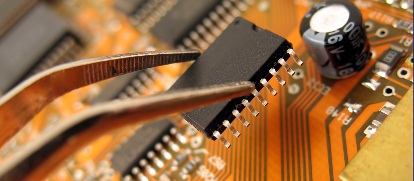About This Degree
The Electrical and Computer Engineering Department is listed in the top 100 college departments according to U.S. News & World Report. Students graduate with nearly 100% job placement and have among the highest starting salaries of all degree programs.
Electrical engineers work with electronics, electricity, and electromagnetism, and electronic devices. Electrical engineering covers a broad range of application areas, including power generation and delivery, transportation (cars and airplanes), communication (radio, TV, wireless, telephones), robotics, computers (memory systems, displays, microprocessors), defense applications (navigation, radar, and secure communication), and consumer electronics (DVD and MP3 players).
Electrical engineering and computer engineering are similar, as both build on the same technical foundation. They differ in that electrical engineering is a broader degree, with additional background provided in areas such as electronics, controls, electromagnetics, and signal processing. Computer engineering has a deeper focus on computers and software, including computer architecture, networking, operating systems, and algorithms.
The electrical engineering degree is accredited by the EAC Accreditation Commission of ABET.
Concurrent Bachelor’s/Master’s Program:
The department also offers a concurrent bachelor’s/master’s program, which allows USU engineering students to begin taking graduate classes during their senior year as an undergraduate and to complete requirements for both the bachelor's degree and the master’s degree concurrently over two years.
ADVISING
At a Glance
College: College of Engineering
Department: Electrical and Computer Engineering Department
USU Locations:
- Logan campus
Program Requirements
Career And Outcomes
Career Opportunities
Since nearly everyone uses electricity and electrical devices, graduates in electrical engineering can work in almost any kind of industry. Electrical engineers develop anything from rockets, cell phones, computers, antennas, signal towers, robotics, and more. The following are examples of areas in which electrical engineers can work:
- Scientific research and development firms
- Electrical component manufacturing companies
- Power generation, distribution, and transmission
- Manufacturers of navigation controls, medical equipment, and measurement devices
- Architectural firms
The Career and Design Center provides counseling and information on hundreds of job and internship opportunities and even helps students apply and interview.
Job Outlook
USU Locations

LOGAN CAMPUS
Admission
Admission Requirements
In addition to Utah State University’s admissions requirements, the electrical engineering program has additional requirements:
- Freshmen: Students that meet the USU admission requirements and meet these minimum requirements can be admitted as a pre-professional electrical engineering major.
- Minimum 2.7 high school GPA
- 19 ACT
- 63 Admission Index
- Must also be “calculus ready”. That is, they must:
- (1) achieve a score of 27 or higher on the math ACT test;
- (2) complete MATH 1050 and MATH 1060 or MATH 1210; or
- (3) achieve an AP score of at least 3 on the AB Calculus or BC Calculus test
- Transfer Students: Transfer students from other institutions or other programs at USU must meet these requirements to be admitted as a pre-professional electrical engineering major.
- Completed at least MATH 1210: Calculus I (with a C- minimum grade)
- Including all completed required Math, Science, and Engineering courses have a 2.8 or higher GPA
- No grades less than C- in required courses
- No more than 3 repeats. The 3 repeat requirement includes courses that are audited or receive a Passing grade. Retaking a course multiple times counts as multiple repeats.
- Recommended high school courses: two or three years of algebra, one year of geometry, one-half year of trigonometry, four years of English, and courses in computer programming, chemistry, and physics are preferred.
International students have additional admissions requirements.
Program Requirements
Students majoring in electrical engineering must complete a capstone design project during their senior year.
Take The Next Step
Visit Campus
Schedule a campus tour and come see what it's all about.
Cost and Aid
Learn about tuition, scholarships, and other financial aid opportunities.
How to Apply
Start your degree path and apply now.
You May Also Be Interested In

Civil Engineering
Learn how to plan, design, construct, and maintain public works and structures like roads, bridges, while also examining the environmental impacts and natural disaster mitigation techniques to solve problems and improve lives.

Computer Engineering
Learn how to design, build, and program various forms of software and hardware, from small electronics and appliances to cars and airplanes, as you learn from experts in a top-tier department with high job placements and starting salaries.

Environmental Engineering
Take the opportunity to solve real-world problems through research that can benefit human lives and improve the environment, as well as gaining valuable hands-on experience in the field with professors and internships with experts.

Mechanical Engineering
Learn to design and create mechanical systems and machines that function in nearly every area of industry as you gain hands-on experience in national student competitions and work with clients to create real-world designs.

